The retrospective we watched on the company's journey demonstrated not just how far we've come but also how formidable our work truly is! When it seems everything in water is seeing increased support, from reduction of energy consumption to air harvesting water vapor, which of those innovations will make a strategic difference in people's access to clean water in the years ahead and why? And how does Water On Demand with Modular Technology fit into that picture? Find out in the replay!
Transcript from recording
Opening
Andrew Boyle: Just so we're clear on the scale of the issue. Each electric vehicle battery for a heavy duty truck weighs £8,000 and you need at least two of them. So we're talking the weight of 4 or 5 cars and my friends and peers in the industry nationwide who have tried to make efforts to put in say, "Hey, I'm going to convert a dozen forklifts to electric" or "I want to tee up a facility for 30 electric trucks."
There is no power. The utilities come back, the cities come back and say, "Is this some kind of joke?" One friend tried to put in, in Illinois, a facility, tee it up for 30 trucks, electrification. The city came back and said, this is some kind of joke. You're asking for more draw than the entire city requires. And just to give you an idea, 30-50 trucks, that's like a five, six megawatt application. The factory that makes the trucks is a two megawatt factory.
Introduction
Riggs: Hello, everyone. Well, I'm spotlighting the energy issue, which is very, very similar to the water issue, right? In that what we're asking these old fashioned grids to do is way past their ability to handle it. And unfortunately, there's not much planning going on with respect to that.
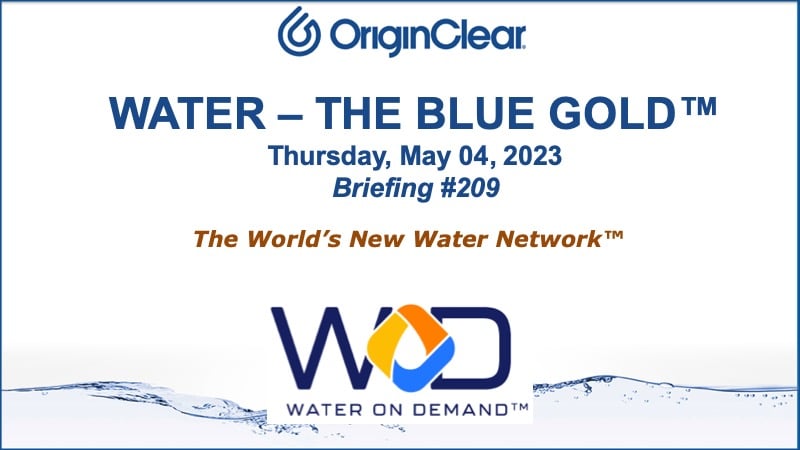
So, first of all, today is Thursday, May 4th, 2023, Briefing Room 209. Last week I was the, I was the genie behind the screen. I was the wizard. While Ken did an amazing job of running a briefing, we wanted to get some good fallback capability. And he did an amazing job. It was one of the most popular briefings. So thank you, Ken.
Ken: I won't quit my day job.
Riggs: Well, you're doing all right. Doing all right.
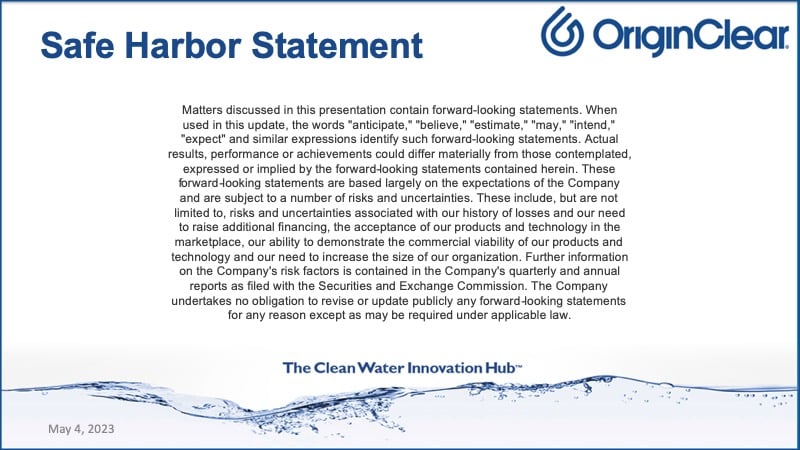
Safe Harbor Statement.
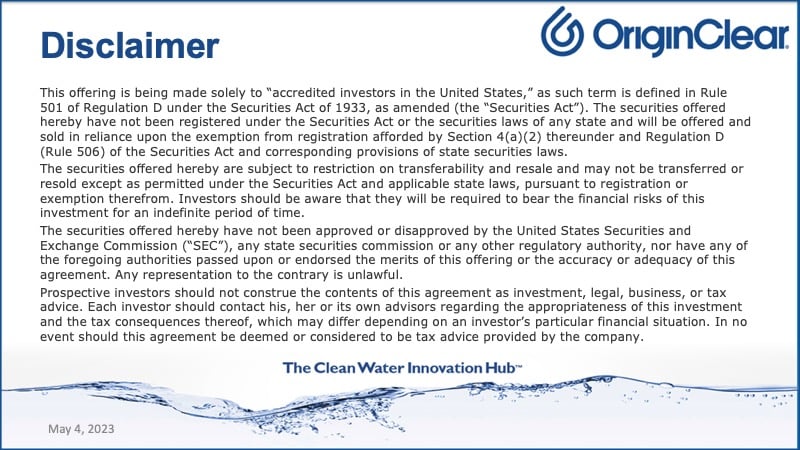
Disclaimer — Regulation D.
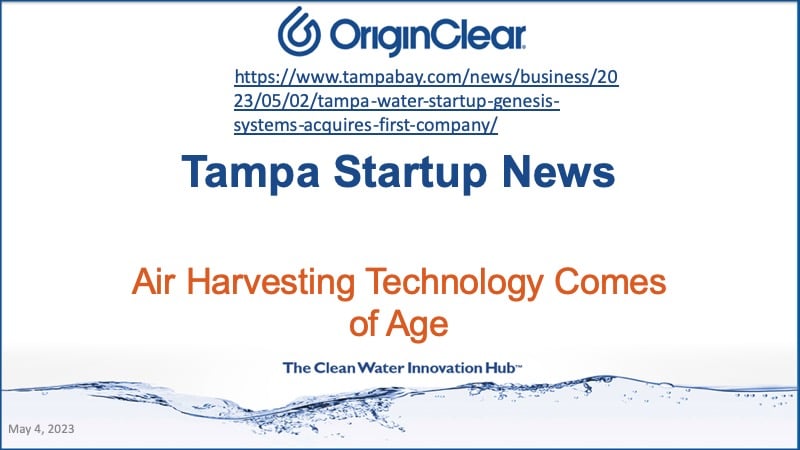
All right. So here's some cool news. A couple of days ago, a Tampa startup is aggregating air harvesting technology.

And this is very interesting because they are scaling up air harvesting of water vapor at utility scale, which is fascinating. This obviously has its limits perhaps, but there's tremendous benefit in this and it will help solve global water scarcity.
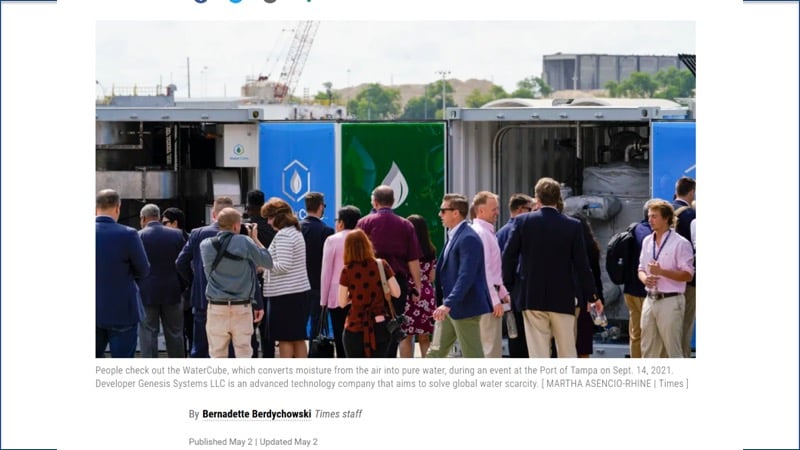
So Genesis Systems acquired another startup that does the same thing. And basically they are creating something called a roll up where they are working on these interesting technologies.
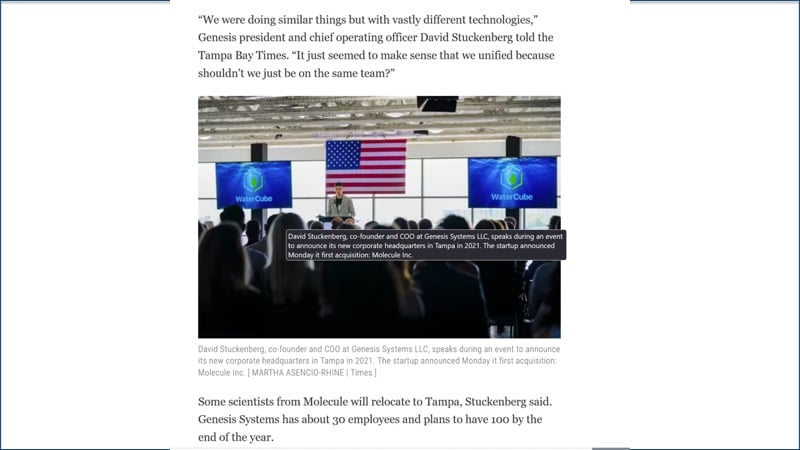
Harvesting water from air has been around for a long time, but it appears to be now achieving momentum. Everything in water is starting to become very, very important.
Replenishment Rate
Okay. The water we take from the air is replenished between nine minutes and nine days for water in an aquifer, it takes about 900 years. So it gives you an idea, right? This is a great way to get water without having to suck it up from an aquifer.
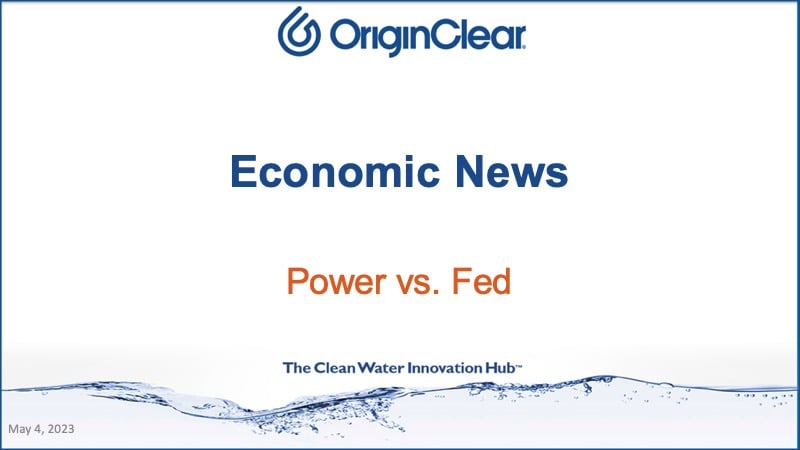
Economic news. Well, Fed Chairman Powell, I apologize, Powell. He doesn't agree with Fed staff that we will see a mild recession. He thinks the labor market is still too tight and he thinks that we have a lot of correcting left to do.
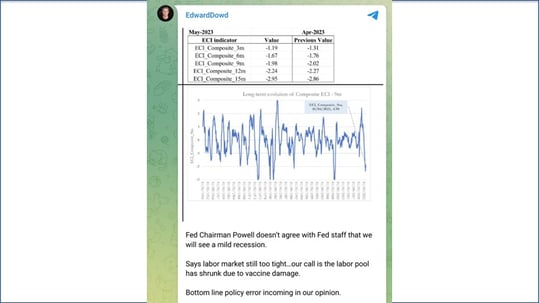
This is really, really interesting. We have a situation where there's a lot of demand for products and a shortage of personnel.
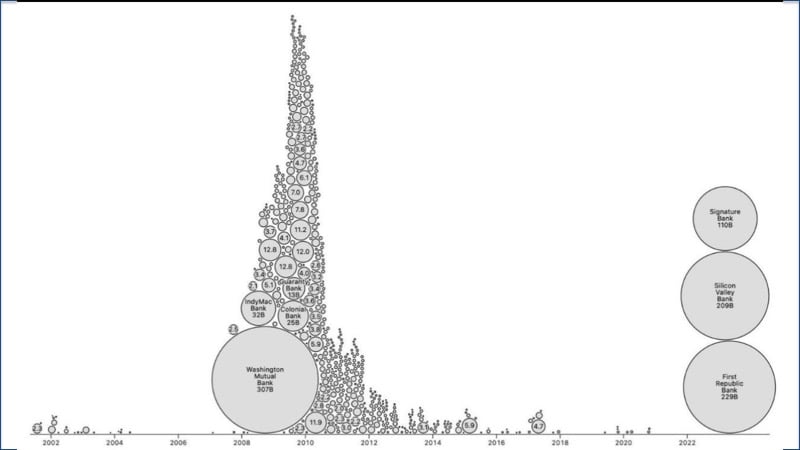
This is an interesting graph that I thought I would share. This is a 2008 2010. These are all the failures that occurred during that period back in 2002. We had a few failures. I think that was the SNL crisis. Then Washington Mutual fell apart. Guaranty Bank, all these guys and then three humongous bank failures have stacked up, which is a whole new world that we're operating in. Three is about it's about half $1 trillion right there. These three banks, personally, I think that we will weather the storm. But it is definitely something where the Fed needs to make sure that confidence is maintained.
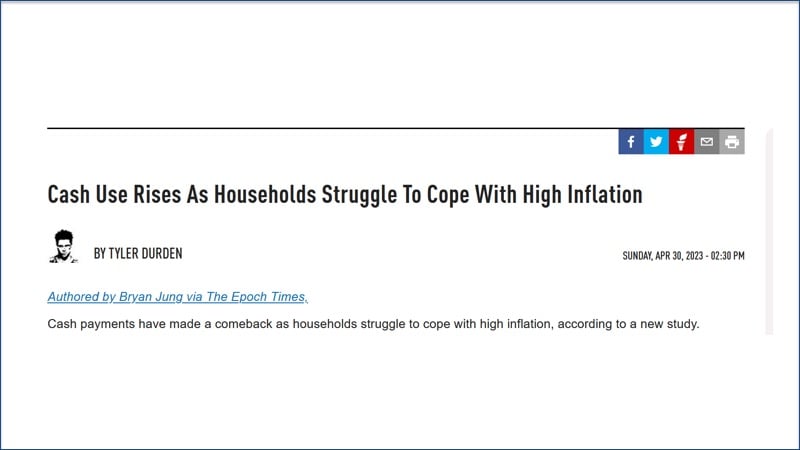
Use of Cash
And sure enough, people are starting to use cash more because, you know, if you got cash in your hand, you're not going to spend it more than what you're in your hand. And 53% of adults in the United States are more likely to use cash than a year ago. Very interesting. And the young are the ones interesting in getting back into cash.
Theory on payments has been to remove friction. Actually, a lot of people want friction back. In other words, make it harder for me to spend. They like that.
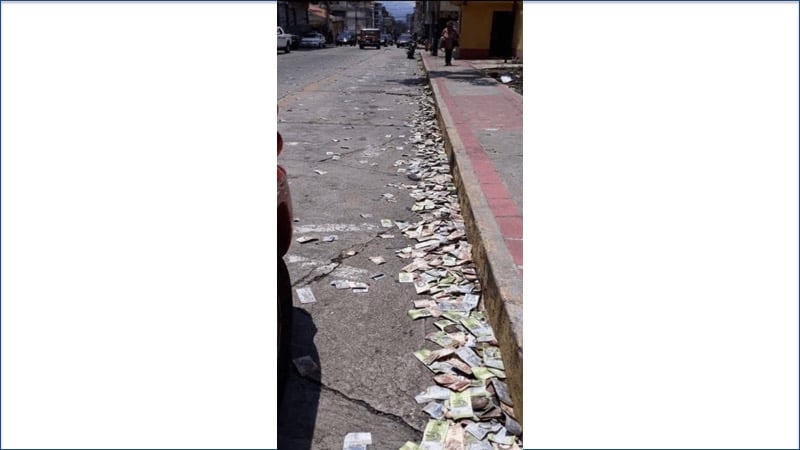
This is an example of what happens. This is Caracas, Venezuela. These are Bolivars. These are currency that is trash. So, when a when a currency goes south, we got a problem, baby. So not a pretty picture. So we I think that we can avoid that. And I think it's a good move that we are moving to cash. All right.
Middle East Water
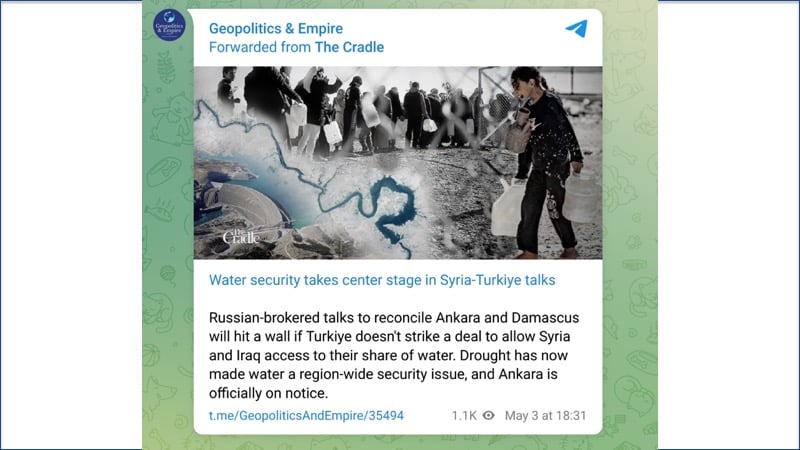
There's stuff happening in water security in the Middle East. Right now, Syria and Turkey are trying to get access to water. As I've mentioned before, Israel is in a very stable position because Jordan and to a lesser extent Egypt use their water. And if you use somebody's water, you're hardly going to attack them. This is now being spread wider, which is a good move. It's an excellent move. Water is a peacemaker.
OriginClear Retrospective
All right. With that, I'm going to launch this really cool video that Stephen, my brother, put together. It takes us back and I think you'll enjoy it. So here we go.
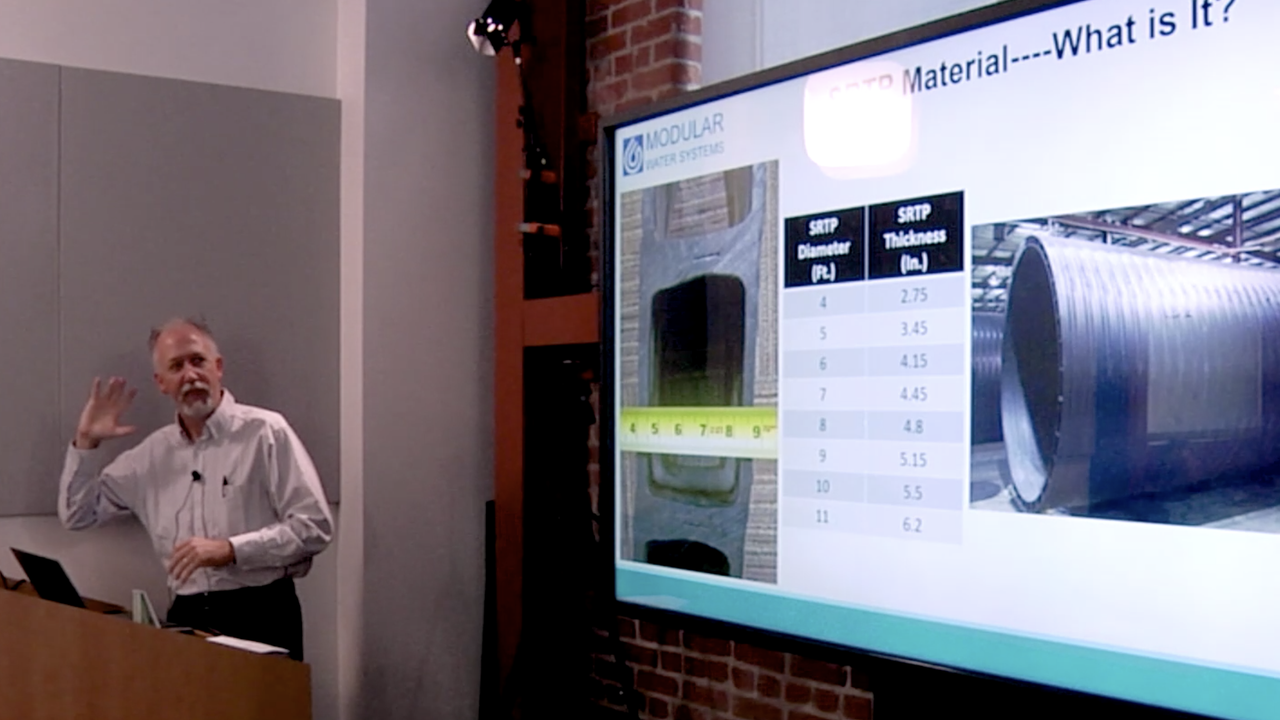
Start of presentation
CEO PhilanthroInvestors: With all the resources we have. We can put a guy on the moon. But our water is horrible. The state of the cleanliness and the scarcity is scary. After all, we can't live without it. That's part of what we're embarking upon and that's what OriginClear is doing in terms of of both saving and sanitizing water and on a much bigger scale.
OriginClear has great bones. We looked into their plans, we looked into their current activity, their current fundamentals, in the sense that they have not only earning capacity but they are earning and that earning is growing. While there is a lot of hope and a lot of intention, there was also a lot of activity backing it up. We have that marriage of motivation and mechanics.
We were looking for who are the other players? It can't be just all Riggs and it wasn't. They have some fabulous people and these people are believers. And if you're an entrepreneur, if you're an investor, you know that there better be a whole bunch of believers because there's obstacles, there's challenges, and only with the what we call FCB, only with the faith, confidence and belief do you get do you get to ride over all of those barriers or challenges.
I must say something also about OriginClear, incredibly innovative. Riggs Eckelberry, the CEO, is not only innovative and very disciplined, but ethical. You know, it's one thing to be innovative and say, "Well, we can cut a corner here, we can cut a corner there." No, when you have this marriage of integrity and innovation, now you've got something. And that's why we've done the licensing.
Riggs: We know that the state of water is not great. We know that more people die from water than war. Billions of people don't have access to safe water. Many illnesses come from bad water. Viruses, you know, we're so concerned about viruses. Well, water is a very important transmitter of viruses and bacteria.
So what we want to do is to help take the general treatment of water in the world up, kick it up a big notch. By that, I mean is, let's take India, for example. This is an entire subcontinent that has virtually no water infrastructure. They have huge dam projects up in the Himalayas to deal with water movements up there. But in places like New Delhi and Calcutta, there's people down in the sewers digging this stuff out and many of them dying from the sewer gases. And this is a terrible situation.
Now, take a look at what happened with cell phones when it came time to put Africa on the telecommunications grid. We bypassed the entire landline idea. Just didn't do it. Didn't have to do that infrastructure. We went straight to cell phones. Cell phone towers. The phones are intelligent. You're done. A similar thing is happening in water.
The decentralization of water treatment means that we no longer need to establish giant water treatment plants at the level of the city because this treatment happening at the point of use. We have a partner in Mexico who makes a business of carting away the sewage from different companies to a central plant. So there's no, there's no sewage pipes. Well, his idea is why not put at each place a little water treatment system? Brilliant. Then he doesn't have to drive his trucks around and he makes much more money. So these are concepts that are blossoming all over the world, and they're being enabled by the idea that do it yourself water treatment.
Ken: The water market, the way I saw it, as an outsider was kind of everybody bumping into each other, all trying to sell what they do to the handful of folks that had tons of financing on hand and were ready to pull the trigger. But that's not the market. 80% of water isn't treated. So let them fight over the 20%. That's cool. Let's work with the 80% that's untreated because that's the real vital need there.
So why aren't they treating water? There's a financial pain point. What if you remove the financial pain point? COVID took some of the smartest entrepreneurs in the country and physically forced them out of business. Now these guys are not out of business because they don't know how to run a business, they don't know how to do service. The government said you can't operate well. They didn't stop being smart. They maybe had to have closed their restaurant or their coffee shop or their laundromat, but they still have what it takes to run a successful business.
So what we're going to do is we're going to provide them everything they need to service 11 million pools. Each pool has about 20,000 gallons. These things have been just getting drained, dumped away. Now, here in beautiful western Pennsylvania, it rains every 14 minutes. So maybe it's okay here. But in Arizona, in the Sunbelt, in Southern California, not a good idea. And in places like Florida, you drain your pool, it floats away. The financial need for this is the reason they do it. But the pleasant consequence is it has a tremendous environmental impact.
Ryan: The environmental impact of saving and reducing or recycling all that water. It's a huge impact for the environment, especially here in the desert, where there's always a constant drought.
Ken: 100 of these pool preservers will be able to prevent the dumping of or in fact save 100,000,000 liters a month. Look at it like this. 100 pool preservers will be able to save 1,000,000,000l of water a year.
Tom Marchesello: Progressive Water Treatment as we know, PWT down in McKinney, Texas, right outside of Dallas. I love that group. They are those hard working guys that just get in there and do the work. The machines they're making and the quality of the work they produce at that facility is phenomenal. It gets all the way down to the simplicity of the welding they do on a machine.
You know they do. Butt welding, for example, on the valves. The precision of the quality of that detail work, that little thing that might be about this big is so exceptionally good. It just is the earmark of how detail oriented they are on something that simplistic, But now, you then expand that across the size of their machines, whether they're making a reverse osmosis machine with 20 filters on it or they're doing a pumping system or a booster skid platform. And these machines range all the way from the size of a Volkswagen car up to the size of the tractor trailer. And they're impressive machines.
And they handled it like champions all the time. They do everything in a way that just is like so easy to them. They're just like, I want to do that today. And then a couple of weeks later, there's this beautiful, incredible machine that you'll see on our site all the time, which is just like, My God, that thing is insanely cool. And it's a really sophisticated piece of technology actually, but they just make it look so simple.
Marc: My name is Marc Stevens and I'm the president here at Progressive Water Treatment. My dad started in water treatment back in the 70s, started his own business in the early 80s, and he invited me to come work with him. And I've been in it ever since. What I learned from him was to treat employees the right way, treat suppliers and customers the right way, and you will have a successful business. That's probably how we have now 20 years of existence behind us.
The world has more contaminated water now than we've ever had before. Luckily, we have equipment that can deal with and clean up and purify water, almost unlimited. Really, whatever contaminant there might be in water, we have a piece of equipment that can clean up and deal with that water. Between OriginClear and Modular Water and Progressive Water, we have a technology that can deal with the majority of the contaminants that enters into our water system.
The Modular Water System, designed by Dan utilizing plastic pipe and plastic panel material is revolutionary. Everything we've seen in the past was always based around concrete and steel, two materials that have a short life and versus the plastic it's 3 to 4 times as long with plastic. The installation is faster, the cost is lower and the life cycle is longer. So when Dan invented this stuff around reinforced plastic pipe, it was just the most advanced anybody in this business has seen.
Dan Early: What we've done is we've taken this industrial municipal scale technology and we've scaled it down so that the everyday man with a low flow can use the same technology to provide the same level of treatment that they would need, that you would get at a much larger facility.
Marc: And whenever we get to talk to customers or engineers, they're usually just completely amazed at the price and the speed at which they can get these things in the ground and working over the dinosaurs of concrete and steel.
When OriginClear came aboard, they exposed us to a lot of wastewater type of applications and customers, customers we would never have come across on our own. And using our equipment to help support, reclamation projects, other kinds of products they have can be used in front of some of our equipment to enhance the performance of that. Just exposure to more of what the US has to offer as far as people who need our products and who also sell and work in the same field.
Dan Early: We are completing the final factory testing and commissioning of the wastewater treatment plant. It's scheduled to ship out for our first customer with Modular Water Systems. This is customer number one. This is a unique customer. It's a regional craft brewer located in New England. This particular system is rated for 1000 gallons per day, but that capability allows us to also scale from 1000 gallons per day to 2500 gallons per day to 5000 gallons per day to 25,000 gallons per day. So it is a scalable design.
Tom Burch: We've been doing business with Dan and working with him on projects for probably ten years or better. He comes up with a design and we help him in the manufacturing process.
Dan Early: This control panel right now is being tested by our sister company located in Dallas, Texas, through an Internet connection. They're actually accessing the control panel, working collaboratively with me and plastic fabricating to test the controls that everything is operating and functioning correctly. Really cool that we can do this located here in Roanoke, Virginia, with our partner in Dallas, Texas. And this same functionality, remote operations, remote monitoring. This is a service that we extend to our customer.
We are at Advanced Auto Parts in Roanoke, Virginia. I'm actually sourcing some replacement fuses. These are standardized fuses. There's nothing special about them. I mean, that's one of the premises behind an engineered solution. Just keep it simple, keep it commoditized, keep it affordable.
Once you template the manufacturing model in one region, it then becomes very, very easy to take that standardized process and then to transplant that. You could have a manufacturing facility in the mid-Atlantic, you can build one in mid Texas, you can build one in Pacific Northwest. They would all use the same manufacturing models, the same engineering programs.
The vision that we have at Modular Water Systems is that we want to deploy an engineering and manufacturing model that utilizes this plastic manufacturing capability. It allows us to create very unique, robust treatment systems in a much smaller compact form. We can factory assemble these things, package them, put them on a truck, put them on a boat, deliver them to the final site and install them. You can't do that with concrete.
With OriginClear, they have a tremendous capability to reach out to the greater world, to broadcast this message into channels and into markets that we never would have been able to do before. And that to me is very, very exciting. I can reach people and reach end users and consultants and customers that I never would have been able to do before. That is really the power of OriginClear.
The existing model that has dominated the marketplace for decentralized technologies is all custom. It's all one off, it's all snowflake, everyone's different. When I first got into the industry 25 years ago, if you were to buy a package, a decentralized package, wastewater treatment facility for a single family home or for a commercial development or for a multi-family residential development, it would be this hodgepodge of parts and pieces. And it's up to the consulting engineer working for the client to piece this puzzle together.
And so the thing that I am doing, the vision I've got, is to standardize these products, standardize the permitting, standardize the engineering, standardize the manufacturing. And what that does, it makes it super easy for those consulting engineers and specifying engineers that work with us on a daily basis. It makes it super easy for them to specify our technologies, and that is a very unique differentiator for us compared to the other competing companies that are in the marketplace.
Even the early stage developers of new technologies, new decentralized technologies. 20 and 25 years ago, they were still very, there's this custom element, this custom design and custom manufacturing element that went with it. It's clunky, it's inefficient, it's expensive. It takes a much longer time period to implement those technologies.
By approaching a very standardized solution, by leveraging these emerging technologies. All of that really speeds up the way you you can build and implement and commission and operate these things. So the analogy of a custom car manufacturer versus a a very standardized assembly line car manufacturing model, that is true. That analogy does apply. It does.
The vision that we have and the model and the business model that we're pursuing, it's different. It is different from what you see of the mainstream conventional existing equipment suppliers and technology providers and the people that we compete with on a day to day basis. They're very entrenched, very conventional business models, not really conducive to innovation and evolution. We're radically different than that. We are really focused on innovation.
The consulting world, the engineering world that I work with and engage with on a weekly basis, when they learn about what we are doing, the technology solutions that we're developing, there is a, they're like, "Wow, I haven't seen anything like this in 20 or 25 years. This is really exciting. Glad to see that people are out there trying to change things and trying to shift the paradigm." Use a paradigm shift. That's a word I commonly hear.
I think the next 2 or 3 years we will see just profound changes in the company where the company is today. It will not look like this 12 and 18 months and 24 months from now, it will be a radically different model. Top line revenue is going to increase. Productization continues to grow. The focus that we have on those things are really going to change the way, the way the company functions and the way it's perceived in the marketplace, especially as we are getting more market exposure, we will become a household name. That's the best way of describing it. It will be a brand, we'll be a brand, a recognizable brand in the water industry.
Investor Eric: The environmentally we need to clean up our water and the United States should be number one in it. And having as pristine as we can, doing.
Investor Bob: Something that is positive and taking care of the situation. And in Flint, Michigan, and in Los Angeles and numerous other places that have had water problems.
Investor Keith: We started giving to a church that dug wells for people who had no drinking water. So when I saw how OriginClear is cleaning water, it seems like the perfect match.
Investor Eric: I mean a lot of people have water in their refrigerators that make ice. Well, that's got to be clean or else we are going to continue with the health problems that we keep running into.
Investor Bob: It is time to do something about it. It's time to really be effective. And I'd like to be a part of that solution by investing in OriginClear.
Investor Eric: I am also a CPA for the last 40 years, very much in tune with changing economics. And one thing right now is with low interest rates and that, what we need to do is get regular cash flow coming back, because it's getting very hard to put money at risk for time.
Investor Keith: My lovely wife Linda here is so tight she's not going to jump into anything. She looks it over very carefully.
Investor Linda: I was a little skeptical at first. I had to see everything, you know, really look at the numbers. But we really believe in what you guys are doing.
Investor Eric: And I was excited about it when they showed it to me, the fact that you get a regular return of principal and interest on an ongoing basis, plus the participation in value growth, an ongoing revenue stream.
Investor Bob: I've been amazed at what you guys have done in the past, and I'm really, really excited about what the future is going to bring, because OriginClear is probably one of the most innovative and interesting companies that I have ever been involved with. And I think the sky's the limit for the future.
Investor Keith: It's been consistent. It's been very lucrative and it's been very fulfilling because we actually feel like we're doing something for the economy.
Investor Eric: Allows you the flexibility to start redirecting things and adjusting if there is a new lifestyle or something that needs to be addressed.
Investor Bob: You know it's a way to make money. And in this time of uncertainty with. Markets going up and going down and everything else. And you guys have been steady for the last two years with regular payments and so I'm betting on the future. I think it's going to be great.
End of presentation
Freewheeling Discussion
Riggs: How cool is that? That was a nice retrospective because we forget how far we've gotten in the last five years. I'm not sure that Estrella is with us.
Ken: You're stuck with me. Estrella will forgive me.
Riggs: Well, what I thought was great is that it laid out all the pieces of the company as they've evolved, and it's pretty much worked out the way we were saying in 2018, right? But what we do know is that Modular Water with, literally they were being interviewed back in 2018, they have executed on their model. It cost us a lot of money and time with the support of investors. But now they almost tripled their revenues and they are part of Water On Demand and it's a rock star combination. So I think that it's really a whole new era.
Looking Back
Ken: Interestingly. About two years ago, Dan said within two years, Holy, holy prophecy, Batman. He nailed it like almost to the month. So kudos to Dan. And look, a lot of the reason we are where we are is because Dan is a bit of a prophet, right? You know, he was the lone man in the wilderness for so long. But he said and I kind of jotted down within I think he said, 18 months or so, you're going to see a profound change in the company. And he was right on the money. So that was great.
Watching our, now, some of that stuff, it was two years old. Rick Keller mentioned how interest rates were so low. And I was like, well, know that wasn't that long ago. Well, you know, but for the same reason, because interest rates are so awful now and energy costs are so high, it's all it's still all about assets, isn't it? Right. Your video of the cash laying in the street in Venezuela, again, all the more reasons for assets. So an asset based on something that is necessary for life should rank fairly high if monetized properly. But watching our evolution was fun on video.
It wasn't always fun living it. That got a little tense. But I was particularly, what made me smile was to see our investors and these folks have been with us for a long time. And I would say that without exception, Keith and Linda and Bob and of course, Rick. And there's there's two dozen others who we didn't feature. They are bigger supporters of ours now than they ever have been, right?
What we took two years ago in some of the, we shot a lot of that video about two years ago, right? Um, that was a great idea founded in the, you know, hurricane of COVID, right? And it was very aspirational. Right? Now look at us. We're talking about the, not the things we're, yeah, we're going to talk about the things we're going to do, but we're going to spend a lot of time in the next few months listing and displaying all of the amazing things that we've already done.
And now, simply now the story is, it's not what we want to do, it's what we've done successfully that no one else has been able to do and now how we're going to scale that, how we're just going to do it bigger. And that's a big deal.
Riggs: Well, this is exciting. Thank you, James Wright. Thank you, Bob.
Ken: Bob is here. Hi, Bob.
Riggs: All right. Well, with that, did you want to get into any final thoughts?
Looking Ahead
Ken: Oh, sure. Um, so, you know, and trying to stay on topic, what Dan was talking about with respect to a profound change in the company. He was relying solely on the brilliance of his patents and their application and the ability to do prepackaged waste water. But you saw how he kind of talked about it then, prepackaged waste water systems. I don't think he could have conceived a complete end to end, um, you know, water is a service model as being a, what I would call a supercharger effect for his technology, for our technology.
With that now in place, I think Dan would tell you, if we had him on today, this far exceeds even his wildest dreams because of the scalability. The scalability just, you were still chasing after the, you know, the folks that had the capital to deploy, when you remove that barrier, this is so we're going to take — And I want to, I want us to spend the next few weeks Riggs, compiling actual brilliant applications that we have now on the ground working.
Let's highlight them. Let's talk about them. Let's narrate them. Let's tell us, let's tell the audience where they are, what they're doing, and then say, okay, now that's — We're already there, right? Now imagine an entire fleet of those that the company owns, and that's where it's going to get exciting.
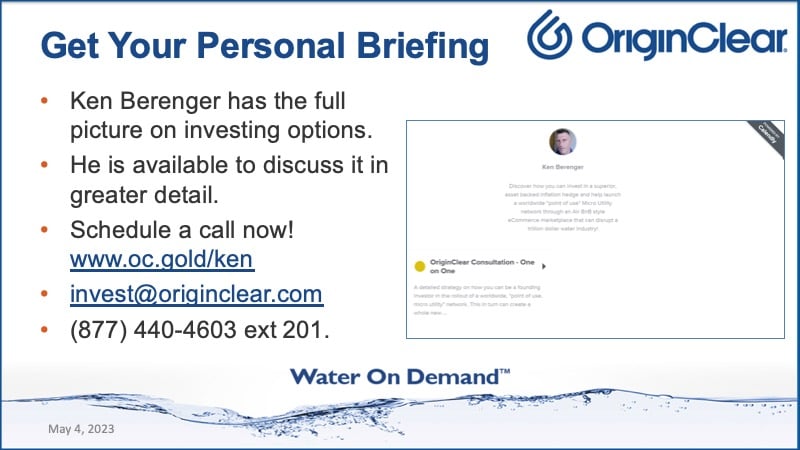
Call Ken
Riggs: I'm excited myself. So if you want to talk to Ken in further depth, here's your contact information. Ken is highly knowledgeable and knows far more than anyone really about anything.
Ken: No, that's someone else you're thinking of.
Riggs: Hahahahaha that's very funny. But he's the most dangerous man —
Ken: In Hollywood.
Riggs: That's very funny. All right, everyone. Well, thank you very much. It's been a great pleasure. Let's let's have some fun.
Ken: I'll just answer Marcus's real quick. Marcus, we don't know for sure. We know it's extremely limited. We're going to pause it very, very shortly, but I couldn't give you a date. Okay.
Riggs: James Wright wants to know about a certain hotel chain. Yeah, well, you know, these hotel chains, we do a great job for them, but that doesn't mean necessarily that they talk about it. But that's okay. We got workarounds and there will be coverage. So with that, I'm going to go ahead and wrap things up. It's been great. I'll see you guys on the flip side next week. Thank you all.
Ken: See you later.
Riggs: Have a great evening.
Ken: Good night.
%20250px.png?width=250&height=53&name=OriginClear%20Logo%202019%20(RGB)%20250px.png)



